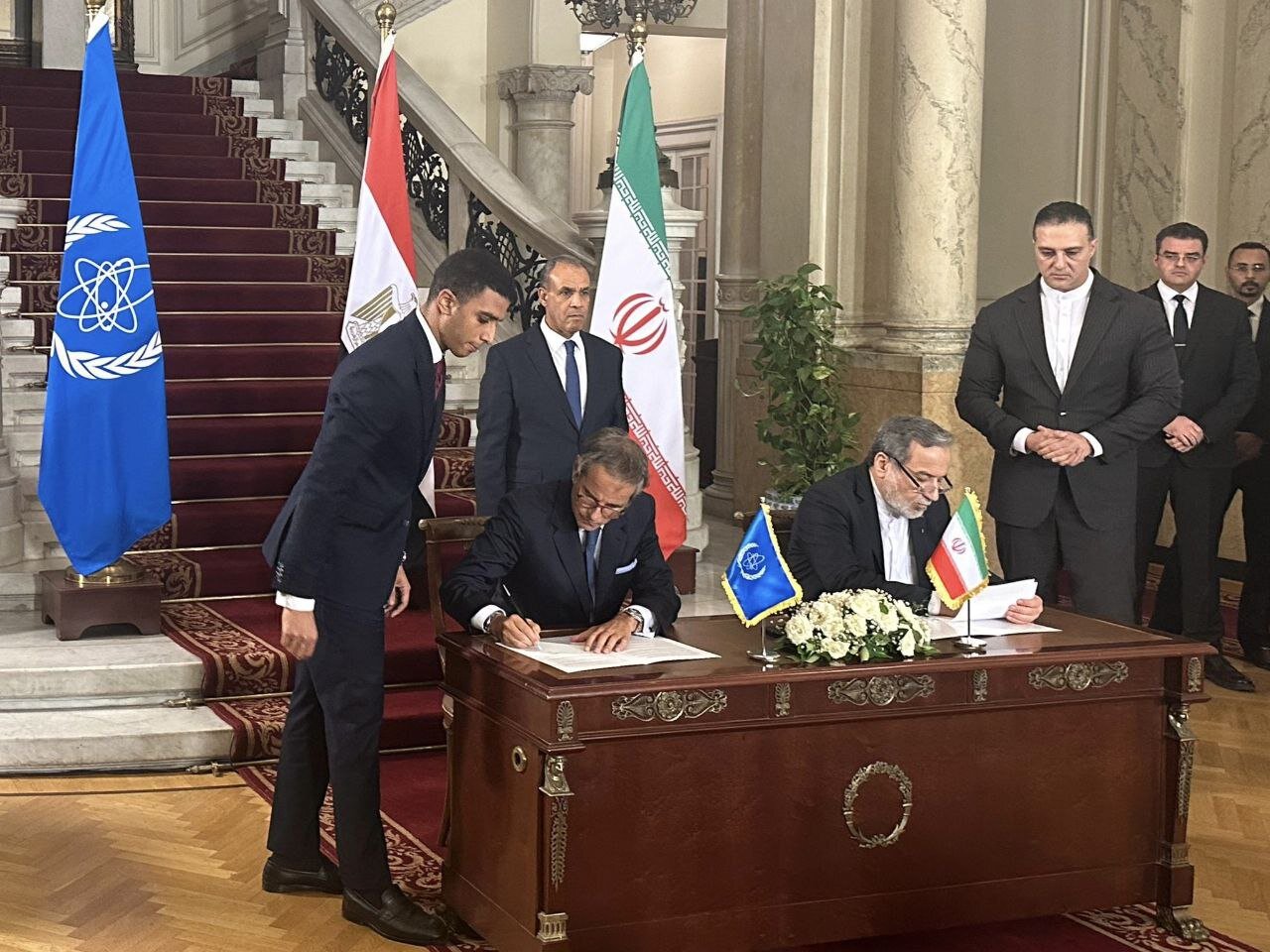After Cairo talks, a cautious resumption of Iran-IAEA cooperation
Inspectors' full return to Iran hinges on sanctions and security body’s judgement

TEHRAN – After a meeting in Cairo between Iranian Foreign Minister Abbas Araghchi and the International Atomic Energy Agency (IAEA) Director General Rafael Grossi, Iran and the IAEA agreed to resume cooperation on Tuesday, an agreement that seemingly pleased Grossi but created a bedlam in the Iranian parliament.
Grossi was all smiles as he posed for pictures with Araghchi and the Egyptian president in the room where his three-hour meeting with the Iranian diplomat was held. Araghchi did not appear as cheerful, a contrast also evident in a subsequent press conference the two men held in Cairo.
The agreement, reached after four rounds of comprehensive talks, received almost immediate backlash from Iranian lawmakers, who had suspended cooperation with the UN nuclear watchdog after Iran’s nuclear sites came under attack by Israel and the United States during a 12-day war in June.
Conservative MP Amir-Hossein Sabeti voiced his opposition to the deal on X, stating that it is "against Iran's national interests" and will "pave the way" for further U.S.-Israeli attacks on Iranian nuclear sites. Sabeti is one of the most vocal anti-West and anti-IAEA figures in Iranian politics. He entered politics through Saeed Jalili, the rival of President Masoud Pezeshkian during the 2024 presidential elections. Jalili previously led Iran’s top security body and served as the chief negotiator for Iran's nuclear program before Araghchi, then deputy to Foreign Minister Javad Zarif, succeeded him and signed the JCPOA with the P5+1 in 2015.
Ebrahim Rezayi, the spokesman of parliament’s security and foreign policy committee, told Iran’s national television on Friday that he and his colleagues are set to review the agreement in the coming days. Rezayi too is thought to be close to the country’s conservative factions, whose traditional opposition to interaction with the IAEA has gained unprecedented momentum within the Iranian society following the recent war.
“We insist and emphasize that the IAEA does not monitor the sites which were attacked, that’s because we are suspicious of the agency, and also have evidence in this regard,” Rezayi explained.
Iranians have long accused the UN nuclear watchdog of acting as a political tool of the West. For instance, a report issued a day before the June 13 attacks on Iran that revived old accusations regarding transparency; is believed to have been aimed at manufacturing consent for the aggression. Grossi, in particular, has been a focus of criticism since taking the helm of the IAEA in December of 2019, as he seems unable to refrain from making political comments and stick to his appointed technical role; furthermore, an Iranian intelligence operation that extracted documents from the occupied territories earlier this year found that Grossi had shared confidential content from his communications with Iranians with Israel, according to Iran’s intelligence ministry.
Concerns are now rising that if IAEA inspectors, most of whom left the country fearing for their safety during the 12-day war, return, they could provide Israelis and Americans with information needed to locate and destroy Iran’s enriched uranium, whose whereabouts the agency and Western states claim are unknown. Iranians have stated that the uranium has been buried within the facilities in Esfahan, Natanz, and Fordow that came under attack. The Bushehr nuclear power plant was the only major nuclear site spared during the 12-day war.
Although the new Iran-IAEA agreement is primarily intended to restart efforts to bring inspectors back to Iran and lacks practical steps, as Araghchi stated during Tuesday's press conference, Grossi has informed the IAEA Board of Governors that it would grant access to "all facilities and installations in Iran" and "contemplates the required reporting on all the attacked facilities, including the nuclear material present.”
Snapback of UN sanctions
Araghchi told reporters in Cairo that the predicted practical steps of the new deal would not be implemented if anti-Iran UN sanctions are restored. European signatories to the JCPOA initiated the process to reinstate the sanctions two weeks ago by triggering the so-called snapback mechanism, a provision within the 2015 agreement that allows signatories to re-impose UN sanctions if they determine Iran is not adhering to its commitments.
Iranians argue that Europe lacks the legal and moral authority to request the return of sanctions, as Tehran only scaled back its commitments a year after the U.S. withdrew from the JCPOA, re-imposed and intensified sanctions, and European nations, in practice, followed Washington's lead. The JCPOA was intended to limit Iran's nuclear activities in exchange for sanctions relief. Analysts have also pointed out that the very nuclear sites upon which the 2015 agreement was based no longer exist due to American attacks that Europe itself endorsed.
Grossi told the IAEA Board of Governors on Wednesday that the agency cannot influence the reinstatement of UN sanctions, an assertion that casts doubt on the prospects for implementing the new deal. Furthermore, some of Grossi’s other statements at the board meeting were later refuted by Araghchi.
During an appearance on Iranian national television, the foreign minister stated that the agreement signed in Cairo does not guarantee IAEA inspectors access beyond the Bushehr nuclear plant. He added that Tehran seeks further discussions regarding how and if inspections can resume, saying, "Based on future reports issued by Iran, the nature of access will have to be discussed at an appropriate time." The diplomat further noted that whether inspectors are allowed to visit Esfahan, Natanz, and Fordow depends on future decisions made by Iran’s Supreme National Security Council (SNSC), which has become responsible for the matter based on the resolution passed by parliament.
Prominent Iranian analysts have not exactly welcomed the resumption of cooperation with the IAEA. But many of them have said they are waiting on the agreement’s content to be officially released.
Leave a Comment